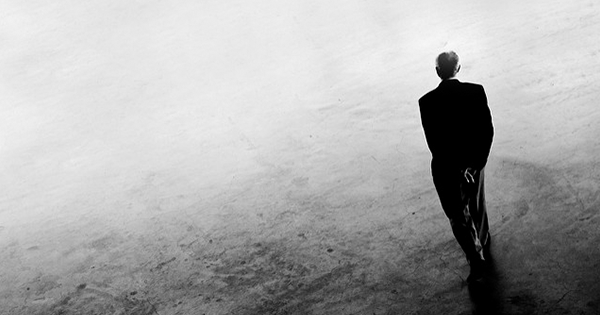
With this piece, Brian Doyle’s Epiphanies column comes to an end. Brian has been writing Epiphanies for three years—the longest tenure by far of any of our bloggers. We hope that these columns have enchanted, delighted, and enriched you as much as they have us. And though we will greatly miss his voice on our website each Friday, we don’t have the heart to say goodbye quite yet: come back next week for five bonus Epiphanies that will help you withdraw.—the Editors
Among the many things that my father was very good at was this: when you said something to him, anything at all, anything in the range from surpassingly subtle to stunningly stupid, he would listen carefully and attentively and silently, without interrupting, without waiting with increasing impatience for you to finish so he could correct or top or razz you, and he would even wait a few beats after you finished your remarks, on the off chance that you had something else you wanted to add, and then he would ponder what you had said, and then, without fail, he would say something encouraging first, before he got around to commenting on what it was you said with such breathtaking subtlety or stupidity.
And he did this not once but many thousands of times, not just with me but also with my sister and brothers, and his lovely bride, our mother, and daughters-in-law, and grandchildren, and colleagues, and friends; so that the number of times he listened patiently and attentively and scrupulously, and then politely waited a few beats to give a speaker a chance to dig deeper into or clamber hurriedly out of the hole he had just dug himself, and then say something gentle and encouraging before tacking finally toward the subject at hand, surely was a million or more, especially given the fact that he and our mother had many children together, and we are American Irish Catholics, which is to say people soaked in three garrulous cultures, each one entranced by story and legend and myth and the tallest of tales.
I well remember some of my own remarkably ill-considered remarks to him, as a surly teenager, as a headlong young man, and as a formerly cocky middle-aged man, and in every one of those cases he was wonderfully consistent in his patience, his calm, his gentleness, his genuine absorption in what I was saying, even though what I was saying was sometimes the most arrant glib foolish nonsense and frippery. I would conclude my burble and babble, and watch him lean back to consider what I had said, and then after a moment he would say something quietly encouraging, and then often he would say several more encouraging things, and then he would finally gently comment on what it was I had said, but never with the slightest sneer or slice, though much of what I said surely deserved to be dismissed out of hand. There was a pace and a rhythm to his listening, it seems to me, such that the listening was far more important than anything else; in so many people the answering, the opinionating, the jockeying, the topping, the shouting of self, the obviation of the other, is the prime work in conversation, but this was not so for my dad, the best listener I have ever known.
His listening is now largely a thing of the past; he and his ears have achieved a great and venerable age, and his hearing is a shadow of what it once was. His mind is as sharp or even more so now as it ever was; his generosity and grace remain oceanic; and you could search whole galaxies, to no avail, for a gentler wittier man. But this morning I find that I very much miss that one little thing he did so well, that was not little—the way he stared at your face as you spoke, with all his soul open and alert for your story, and how he would wait a few beats when you were done, in case there was a coda coming, and then he would lean back and consider what you had just said, and then finally lean forward again and say something gentle and encouraging. That he would often then add something wise and piercing is true, but that is not what I want to leave you with; I want to celebrate his listening, for it is now nearly gone from this world, and it was a rare and extraordinary and unforgettable thing—as you see.

